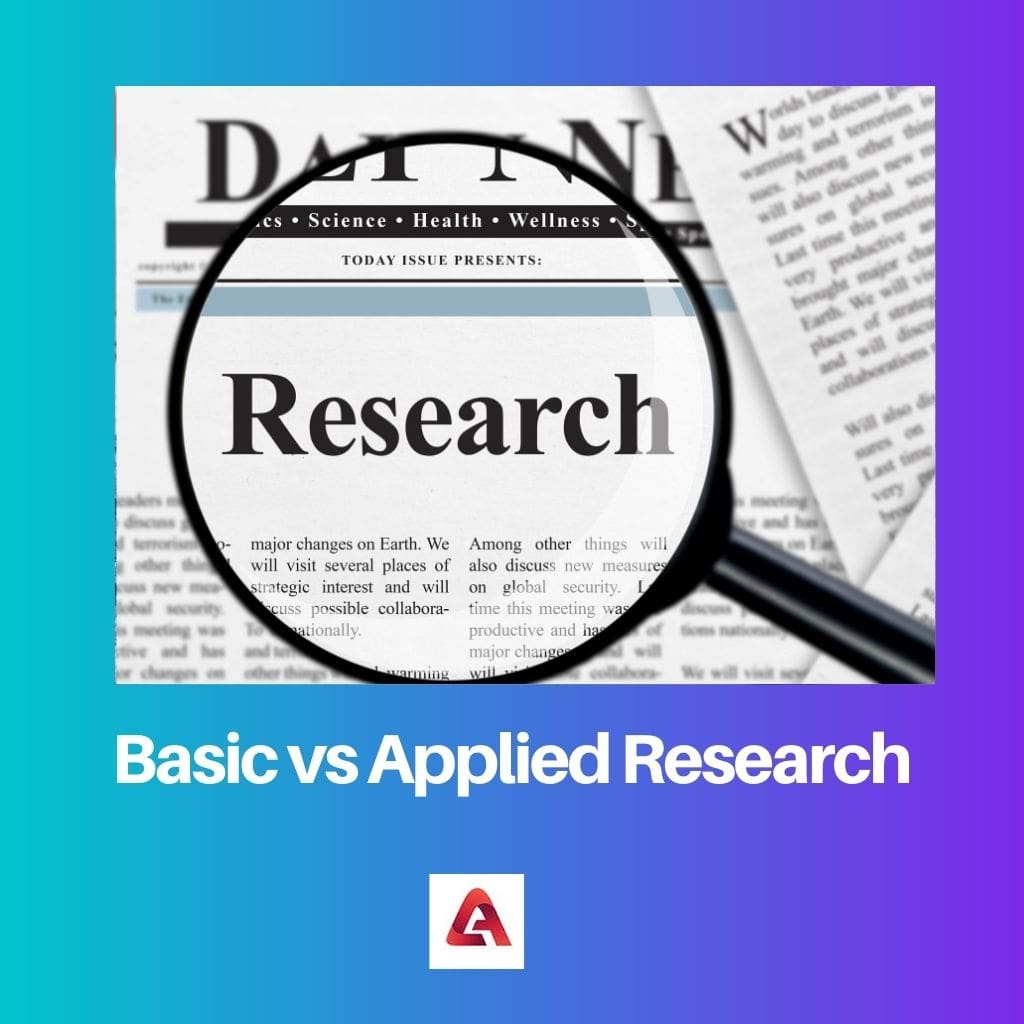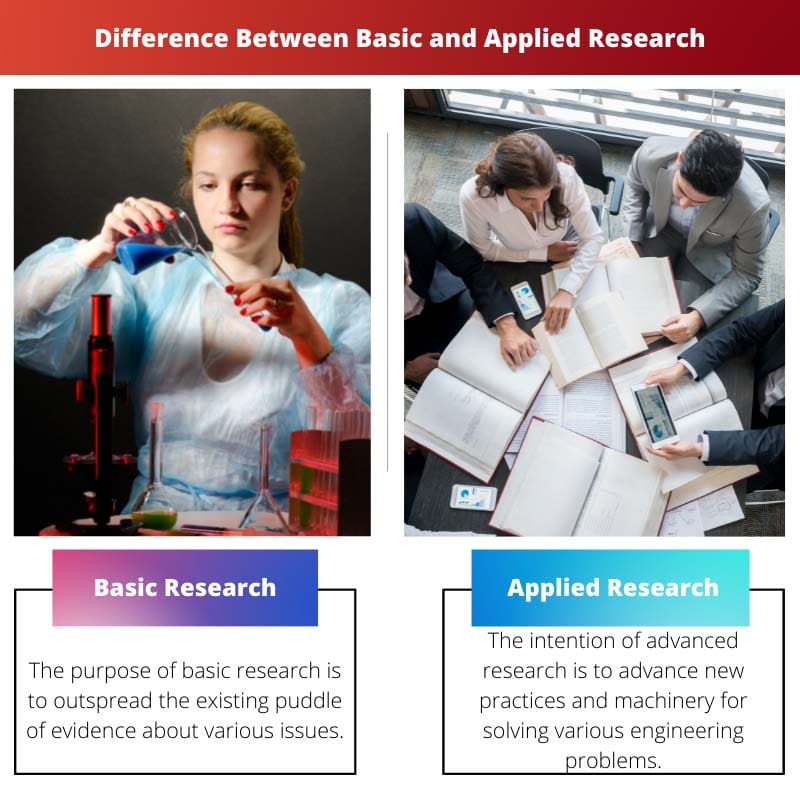Basic research aims to expand scientific knowledge and understanding without specific application in mind, focusing on fundamental principles and theories. Applied research, on the other hand, utilizes existing knowledge to solve practical problems or develop new technologies, often with direct real-world applications and outcomes.
Key Takeaways
- Basic research is focused on expanding knowledge and understanding of a topic without any immediate practical application.
- Applied research is focused on solving specific problems and developing practical solutions.
- Basic research provides the foundation for applied research and leads to practical applications.
Basic vs Applied Research
Basic research, also known as pure research, focuses on expanding knowledge and understanding fundamental principles, without immediate practical application. Applied research is designed to solve specific, practical problems, using scientific theories and principles developed from basic research for practical, real-world applications.

Primary research is applied to bring people advanced information about what is already available. Applied Research involves more practical insinuations and is beneficial to solve business glitches quickly.
Since you all learned the fundamental difference between Basic and Applied Research, now it is time for you to understand the points of difference and comparison of both terms.
Comparison Table
| Feature | Basic Research | Applied Research |
|---|---|---|
| Goal | To expand existing knowledge and understanding of a subject | To solve a specific, practical problem |
| Focus | Broad and exploratory | Narrow and specific |
| Theory | Focuses on developing and testing theories | Uses established theories to find solutions |
| Outcomes | New knowledge, principles, and concepts | New products, processes, or techniques |
| Funding | Often funded by government grants or private foundations | Often funded by companies or government agencies with specific needs |
| Examples | Studying the evolution of galaxies, exploring the behavior of subatomic particles | Developing new vaccines, testing the effectiveness of different teaching methods |
What is Basic Research?
Basic research, also known as pure or fundamental research, is a systematic investigation driven by curiosity to expand the existing body of scientific knowledge. It seeks to understand the underlying principles of natural phenomena, without any immediate application or practical goal in mind.
Objectives and Goals
- Advancing Knowledge: Basic research aims to push the boundaries of human understanding by delving into unexplored areas of science. It seeks to answer fundamental questions about the universe, life, matter, and energy.
- Formulating Theories: Scientists engaged in basic research formulate hypotheses and theories based on empirical evidence and experimentation. These theories provide frameworks for understanding natural phenomena and guiding further research.
- Promoting Innovation: Although basic research may not have immediate practical applications, it often lays the groundwork for future technological advancements and innovations. Discoveries made in basic research can lead to unexpected breakthroughs and inventions.
Characteristics
- Exploratory Nature: Basic research is driven by curiosity and a desire to explore the unknown. Researchers often pursue avenues of inquiry without specific end goals, allowing for serendipitous discoveries.
- Long-Term Perspective: Unlike applied research, which focuses on solving immediate problems, basic research takes a long-term perspective. It may take years or even decades before the implications of a discovery become apparent.
- Open-Ended Inquiry: Basic research is characterized by open-ended inquiry, where researchers are free to pursue diverse lines of investigation without predefined constraints. This flexibility allows for creativity and innovation in scientific exploration.

What is Applied Research?
Applied research is a systematic inquiry conducted with the specific intention of solving practical problems or developing new technologies. It translates existing scientific knowledge into tangible applications, addressing real-world challenges across various fields.
Objectives and Goals
- Problem-Solving: Applied research seeks to identify solutions to concrete problems faced by industries, governments, and society at large. It aims to develop practical interventions, products, or processes that improve efficiency, effectiveness, or quality of life.
- Innovation and Development: Researchers engaged in applied research aim to innovate new technologies, products, or methodologies that have direct real-world applications. They often collaborate with industry partners or stakeholders to ensure that their findings address current needs and market demands.
- Validation and Optimization: Applied research involves testing and validating theoretical concepts in real-world settings to assess their feasibility, reliability, and scalability. Researchers refine and optimize solutions based on empirical data and feedback from end-users.
Characteristics
- Practical Orientation: Applied research is driven by the desire to solve practical problems or achieve specific outcomes. Researchers focus on developing solutions that address real-world needs and challenges.
- Interdisciplinary Approach: Applied research often involves collaboration across disciplines, drawing on insights from various scientific fields, engineering, and technology. This interdisciplinary approach facilitates the integration of diverse knowledge and expertise to tackle complex problems.
- Action-Oriented: Applied research emphasizes the implementation of solutions and the translation of research findings into practice. Researchers actively engage with stakeholders, industry partners, and end-users throughout the research process to ensure relevance and applicability.

Main Differences Between Basic and Applied Research
- Goal:
- Basic research aims to expand scientific knowledge and understanding without specific application in mind.
- Applied research focuses on solving practical problems or developing new technologies with direct real-world applications.
- Focus:
- Basic research explores fundamental principles and theories underlying natural phenomena.
- Applied research translates existing scientific knowledge into practical solutions to address specific challenges or needs.
- Time Horizon:
- Basic research often takes a long-term perspective, with discoveries contributing to future scientific advancements.
- Applied research tends to have a shorter time horizon, aiming to deliver tangible outcomes or solutions within a relatively short timeframe.
- Approach:
- Basic research is characterized by open-ended inquiry and curiosity-driven exploration.
- Applied research is action-oriented, emphasizing the validation and implementation of solutions to real-world problems.
- Collaboration:
- Basic research may involve collaboration among scientists and researchers from diverse fields to explore theoretical concepts.
- Applied research often involves interdisciplinary collaboration with industry partners, stakeholders, and end-users to develop practical solutions and innovations.
- Impact:
- Basic research contributes to the advancement of human knowledge and understanding of the universe.
- Applied research has a direct impact on society, economy, and quality of life by addressing specific challenges and improving existing technologies or processes.

- https://www.ncbi.nlm.nih.gov/pmc/articles/PMC1284058/pdf/9316255.pdf
- https://journals.lww.com/spinejournal/Abstract/1981/07000/Spinal_Cord_Injury__Review_of_Basic_and_Applied.1.aspx

The article clearly establishes the difference between basic and applied research, emphasizing the importance of each approach in the scientific field. It’s enlightening to see the role of basic research and its impact on scientific progress.
Absolutely, Anthony. The insight provided highlights the value of both basic and applied research, shedding light on their distinct characteristics and contributions to the scientific community.
The article provides a comprehensive overview of basic and applied research, underscoring the intrinsic value of each approach in advancing scientific knowledge and addressing real-world challenges. The portrayal is both enlightening and informative.
Indeed, Alan99. The comprehensive overview embodies the essence of both basic and applied research paradigms, fostering a profound appreciation for the multifaceted nature of scientific progress.
The elucidation of basic and applied research provides a holistic view of the scientific inquiry landscape, emphasizing the symbiotic relationship between foundational knowledge expansion and practical problem-solving. This comprehensive portrayal enhances the appreciation for both research paradigms.
Well stated, Campbell Maria. The elucidation of this symbiotic relationship enriches the understanding of scientific inquiry, emphasizing the collaborative nature of foundational knowledge expansion and practical problem-solving.
Absolutely, Campbell Maria. The comprehensive portrayal of the symbiosis between basic and applied research resonates with the intricate dynamics of scientific progress, emphasizing their collective role in advancing knowledge and addressing real-world challenges.
The article elegantly delineates the motivation, methodology, and role of basic and applied research, highlighting the interconnectedness of these research paradigms. This clarity facilitates a deeper comprehension of their respective contributions.
Precisely, Kimberly08. The interconnectedness of basic and applied research is adeptly depicted, offering readers a nuanced understanding of their intrinsic value in advancing scientific knowledge and addressing practical challenges.
The comprehensive insight provided in this article elucidates the subtle yet profound distinctions between basic and applied research, shedding light on their unique motivations, outcomes, and contributions to scientific inquiry. An exemplary portrayal of the research landscape.
Absolutely, Kyle84. The nuanced distinctions highlighted in this article unravel the multifaceted nature of scientific exploration, emphasizing the intricate interplay between foundational knowledge expansion and practical problem-solving.
The comparison table is a fantastic addition to this article, providing a clear breakdown of the differences between basic and applied research. It serves as a valuable resource for individuals looking to understand these research methodologies.
Indeed, Dmason. The comprehensive nature of the comparison table enhances the accessibility of this information, making it easier for readers to grasp the nuances of basic and applied research.
I couldn’t agree more, Dmason. The clarity offered by the table simplifies the understanding of these research types and their respective focuses, methodologies, and outcomes.
The article effectively captures the essence of basic and applied research, acknowledging the significance of curiosity-driven exploration and goal-oriented problem-solving in scientific endeavors.
Absolutely, Wood Lola. Both basic and applied research play critical roles in advancing knowledge and addressing real-world challenges, underscoring the multifaceted nature of scientific progress.
Well stated, Wood Lola. The delineation of objectives and characteristics for each research type offers a comprehensive overview, highlighting the complementary nature of basic and applied research.
The delineation of basic and applied research underscores the symbiotic relationship between fundamental scientific exploration and real-world problem-solving. This distinction provides a holistic view of the research landscape.
Absolutely, Nwalsh. The article’s portrayal of this symbiotic relationship offers a comprehensive perspective, embodying the intricate balance between scientific curiosity and pragmatic utility.
Indeed, Nwalsh. Recognizing the symbiosis between basic and applied research is crucial to appreciating the dynamic interplay between theoretical knowledge expansion and practical application.
The elucidation of basic and applied research is commendable, shedding light on their divergent motivations, time horizons, and funding sources. The distinction helps clarify the intricate dynamics of scientific exploration and problem-solving.
Certainly, Fstewart. The article serves as an invaluable resource for individuals seeking to discern the unique attributes of basic and applied research, fostering a deeper understanding of their roles in scientific innovation.
The delineation between basic and applied research is pivotal to understanding the distinctive objectives, methodologies, and outcomes associated with each approach. This article conveys the essence of both research types effectively.
I couldn’t agree more, Wmurphy. The depth of insight provided facilitates a nuanced understanding of basic and applied research, fostering an appreciation for their respective contributions to scientific inquiry.